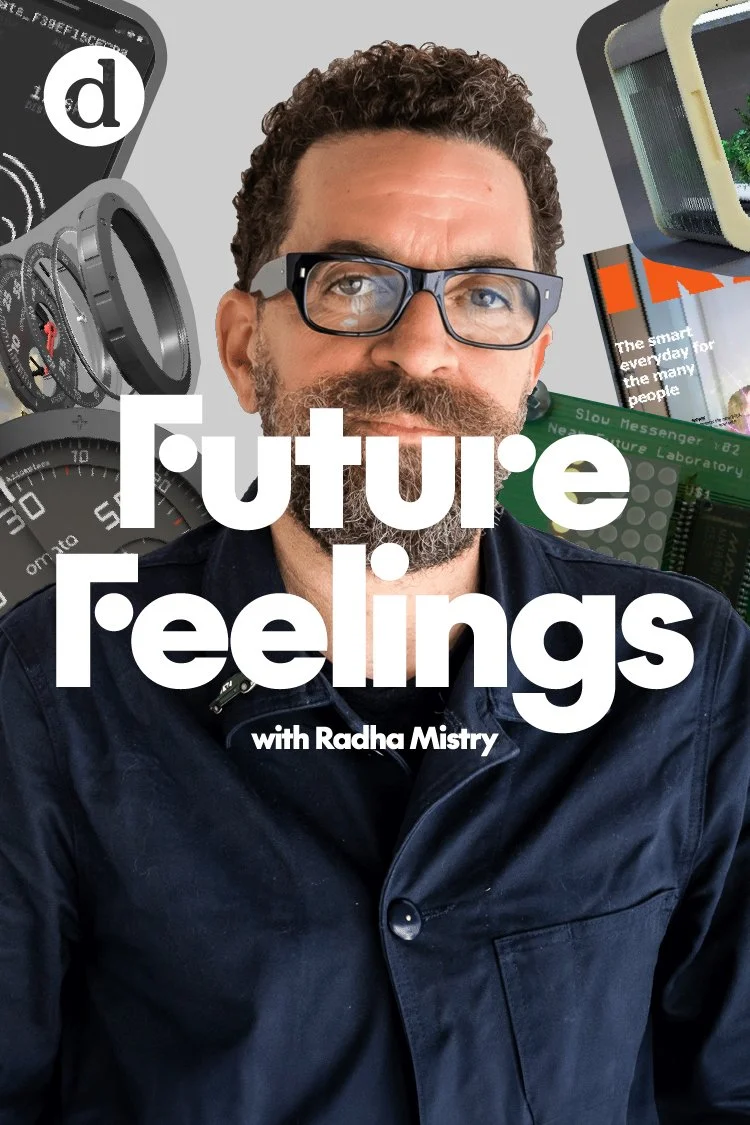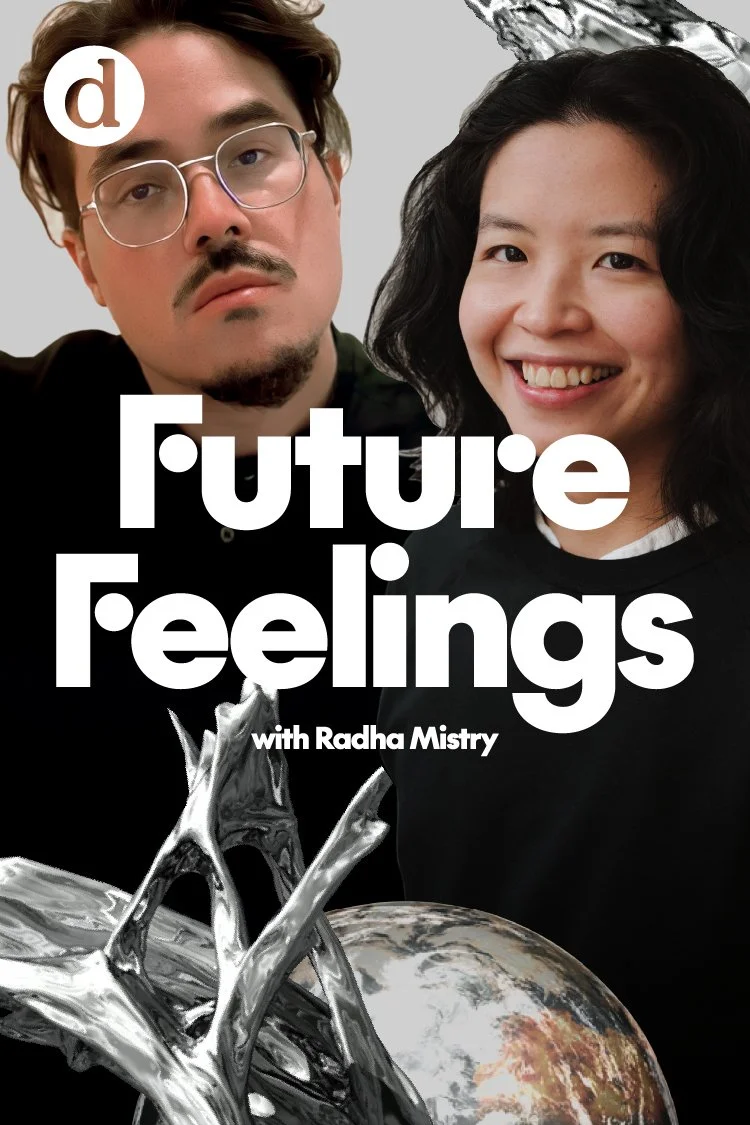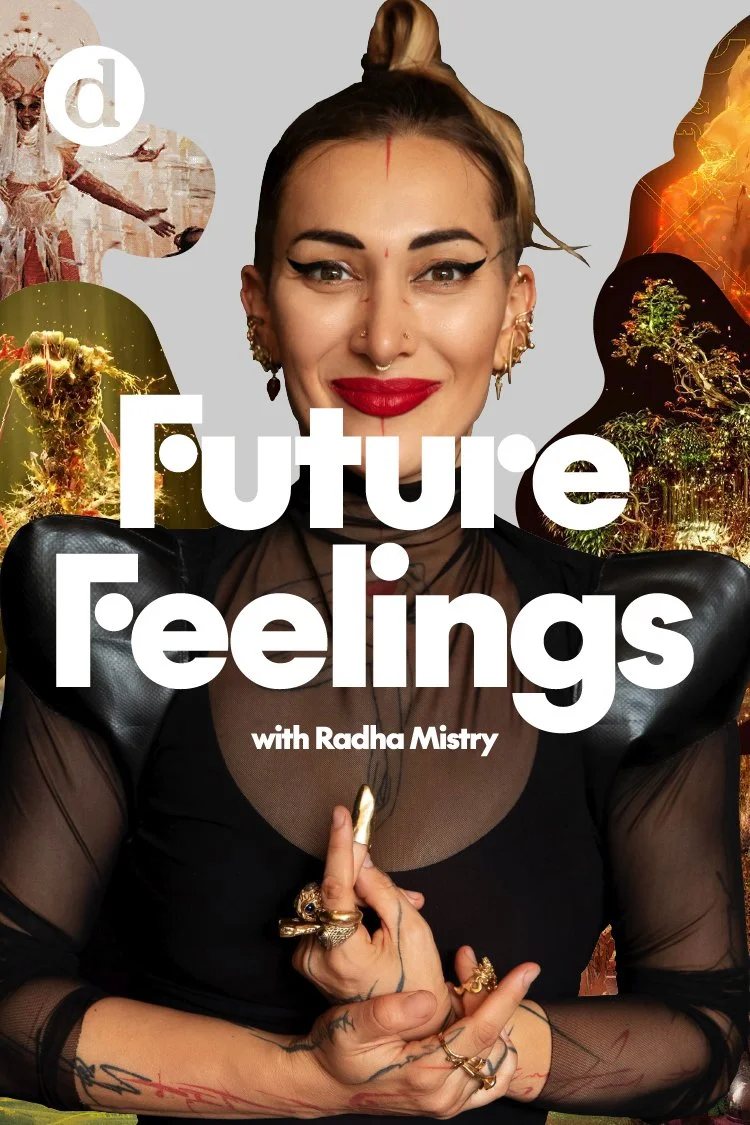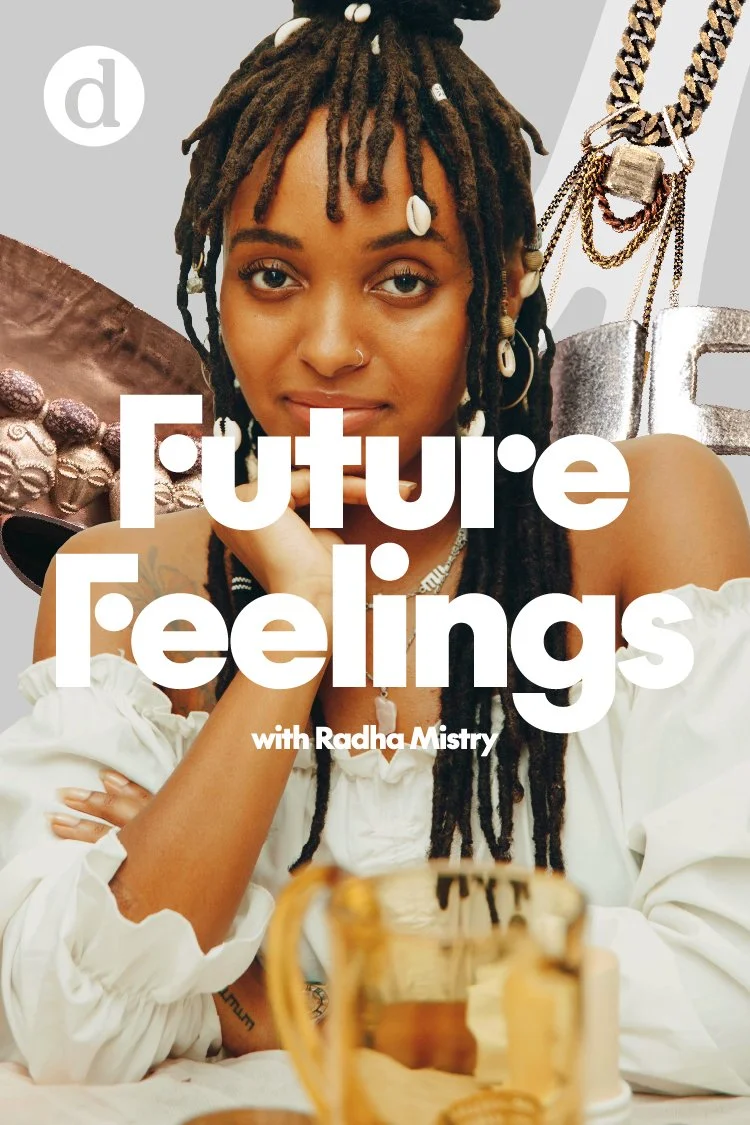Introduction to Dreaming Different
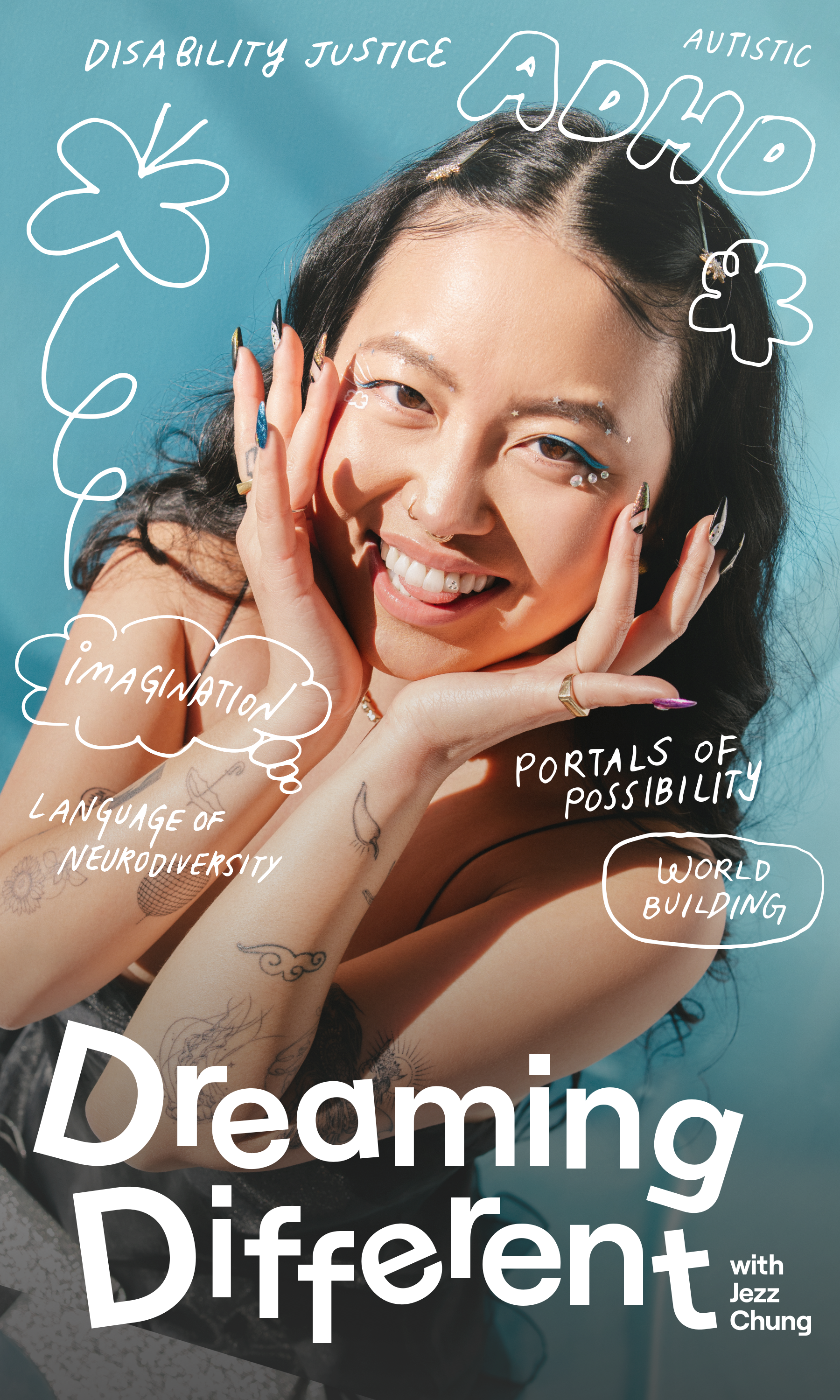
Cover art for the audio series features Jezz Chung, an Asian person with tattoos and long black hair, smiling with their hands framing their face in a playful gesture. At the bottom is bold white text that reads: Dreaming Different with Jezz Chung. Floating around Jezz’s face are topics from the intro episode in handwritten type: language of neurodiversity, imagination, disability justice, ADHD, autistic, portals of possibility, world building.
Dreaming Different is an exploration of worldbuilding guided by the question: How can we design the future through a neurodivergent lens?
Hosted by Jezz Chung, this six-episode podcast series includes conversations with organizers, artists, cultural philosophers, and scientists to explore how a better understanding of neurodiversity—including the language and experiences of it—can help us create cultures that are more inclusive, equitable, accessible, creative, and connected. It’s our hope that through imagination and conversation, this series helps you think, and ultimately dream, a little differently.
Listen on Spotify | Apple Podcasts | Google | Stitcher | Amazon Music | Pandora
Jezz Chung (@jezzchung) is a queer, neurodivergent, autistic, Korean American who works as a writer, actor, consultant, and educator in Brooklyn, New York. Their book THIS WAY TO CHANGE with Chronicle Prism comes out next Spring.
This introductory episode introduces our host, Jezz Chung, and lays the foundation for the approaches, people, and topics that listeners can expect throughout “Dreaming Different.” Jezz—a queer, neurodivergent, autistic, Korean American artist—gives context to their upbringing and personal journey with the concept of neurodiversity, introduces key terms and ideas, and guides us through a series of soothing somatic exercises that you can return to at any point throughout the series.
“I see language as a portal to the future. As a writer, I obsess over the possibilities provided by language. Language helps me identify and articulate my experiences, which then helps me feel them and heal them. Sometimes I don’t know how to heal something because I don’t even know how to identify it within my body.”
—Jezz Chung
Transcript
Jezz
Welcome to the intro episode of Dreaming Different with Deem Journal and Jezz Chung. I'm so excited that you're listening to this or reading this and a little background on how we got here and why we wanted to start this series. When I first discovered Deem Journal, I thought: this is a publication from the future. I got so excited that I was finding a journal about design and social practice and equity and art and just so many intersections of things that I think about on a daily basis. I was a contributor to the third issue, I was so honored to be interviewed for it and talk about neurodiversity and communal care frameworks for that issue and we've kind of been in an ongoing collaboration since. We did a forum on neurodiversity in January 2022 that you can find on YouTube by searching “Deem Journal + neurodiversity.” We've just been in dialogue since and we realized that we are thinking about the same things, orienting ourselves around the same things, and we thought alright— this is a great time to archive these conversations and explore in a way where we can share these explorations with people like you.
I think also what is so juicy about this series to me is that it's world building in live action form and world buildinging to me is so fun. It's an act of play and imagination. I think of equity and access as an act of creativity because sometimes it can be really daunting to think about the impact of what bell hooks calls “white supremacy heteropatriarchy capitalism” the combination of that plus ableism can feel so daunting to address that I am always interested in infusing joy into the process. How can we make it enjoyable? Shout out to adrienne maree brown who is on one of the covers of a Deem issue. And adrienne maree brown talks about pleasure activism and pleasure principles and I think all of these things that we're going to talk about in this series, we hope can help you feel good. And also create a world that's just more inclusive, equitable, accessible, creative, and connected. So our hope for you as listeners and readers is that this series helps you think differently.
Dreaming Different is a series of conversations with world builders, organizers, artists, and cultural philosophers to explore the question: how can we build a future through a neurodivergent lens? One of the biggest symptoms of oppression is a suppression of our imagination and with these conversations, we hope that you can dream a little differently.
A little bit about me as your host. My name is Jezz Chung, you can use they/them pronouns when referring to me. I'm a first generation American born to Korean migrants, raised in Georgia and Texas. And I've been living in New York City for 5 years now after about 4 years in LA. The land I live on here in New York City is possible through the stewardship of the Lenape people who were displaced through European settler colonialism. I'm queer, non-binary, disabled, neurodivergent, autistic, ADHD, and I've experienced chronic depression and anxiety since childhood. My background is in strategy, project management, copywriting, and diversity equity inclusion justice work in advertising and during the first year of the pandemic, I—like many people— left my corporate job to pursue my creative calling and practices full time. Lately I make a living by writing, modeling, I'm venturing into acting, and everything I do, I do with the hopes of helping people feel less alone and more alive. I'm currently writing a book due Spring 2024 called THIS WAY TO CHANGE with Chronicle Prism. And this book is an exploration of the intersections of personal transformation and collective change and you can stay up to date via my Instagram @jezzchung and my newsletter Little Luxuries which you can find on my website at jezzchung.com.
And to me, what makes me so obsessed with the language of neurodiversity is because I see language as a portal to the future. As a writer, I obsess over the possibilities provided by language. Language helps me identify and articulate my experiences, which then helps me feel them and heal them. Sometimes I don't know how to heal something because I don't even know how to identify it within my body. The work of somatics— which just means of the body— really has helped me kind of identify the legacy and the mechanics of systemic oppression within my body so that I can undo them and heal myself and free myself. So all this language helps me find people with similar experiences and most of all similar values and visions of the world.
I’m very very intentional about the people I collaborate with and the entire team at Deem from Alice to Nu to Alexis to Jorge to Jun to Isabel have all been so integral to the conception shaping and producing of the series and I'd also like to note that access and care has been an important part in every step of the process and working with them has reminded me that we can indeed find people who align in values and enjoy the process of collaboration. So I just want to remind anyone who is listening or reading that it is possible to enjoy the work that you're doing and enjoy the people that you work with.
So I’ll next go into my discovery of the language of neurodivergence, neurodiversity, being neurodivergent. I discovered this language as I was continuing to study abolition, transformative justice, and disability justice. These movements I saw happening online and around me, within the communities I admire and the people that I look to as leaders for liberated thinking and to me, it felt like a no-brainer in that all of this feels like things we should all be considering if we are to build a future that divests from harm and invests in care. And for people who aren't familiar with abolition and transformative justice, the best way that I personally can summarize it is all of these movements are invested in creating a culture of care and divesting us away from harm and punishment into community collaboration and connection. Something that really informs my thinking is summarized by Chinese American philosopher and community organizer Grace Lee Boggs who said: transform yourself to transform the world. This is also why I'm really interested in disability justice, which again, to summarize, disability justice teaches us: when we build environments and social structures that support those who are the most marginalized and most vulnerable and least protected, we uplift everyone. Everyone benefits from that. The legacy of ableism is really hard to identify sometimes because it's so deeply ingrained in our cultures, from the language we use, the value systems we perpetuate, and for me, orienting myself around neurodiversity as a paradigm and framework helps me identify the sneaky ways ableism impacts the way that I love and care for myself and the people around me.
And for anyone who is thinking, “okay I don't know what this means, like what is neurodiversity? What is this buzzword that I've been hearing and reading?” Neurodiversity, to put simply, is brain and diversity. Neuro means brain, diversity is just a variety. So the truth is, neurodiversity is a fact of life. We all have differences in how our brain functions, how we learn, how we socialize, how we relate to and experience ourselves and the world around us. Neurodiversity is a reminder that we have differences and these differences are okay. Not only okay, but they actually make us better as a collective humanity.
It reminds me of something that Audre Lorde has taught. She said, “It is not our differences that divide us. It is our inability to recognize, accept, and celebrate those differences.” So really another way to put neurodiversity is, it's a celebration of our differences. And in the show notes we'll include a resource of intro terms and definitions if you want to dive more into the language. Nick Walker of the website neuroqueer.com has a really great resource for that and I'd also like to read an excerpt from Harvard Health that summarizes neurodiversity. “Neurodiversity describes the idea that people experience and interact with the world around them in many different ways; there is no one "right" way of thinking, learning, and behaving, and differences are not viewed as deficits. The word neurodiversity refers to the diversity of all people, but it is often used in the context of autism spectrum disorder (ASD), as well as other neurological or developmental conditions such as ADHD or learning disabilities. The neurodiversity movement emerged during the 1990s, aiming to increase acceptance and inclusion of all people while embracing neurological differences. Through online platforms, more and more autistic people were able to connect and form a self-advocacy movement. At the same time, Judy Singer, an Australian sociologist, coined the term neurodiversity to promote equality and inclusion of "neurological minorities." While it is primarily a social justice movement, neurodiversity research and education is increasingly important in how clinicians view and address certain disabilities and neurological conditions.”
Also I think it's important to note that Judy Singer is autistic herself and in her words, she describes neurodiversity as just a new way of saying, “from each, according to their own ability, to each, according to their own needs.” And this is a quote from Louis Brun, 19th century French socialist.
[Enthusiastically] Also, I do want to share for people listening and reading, I am really enjoying this as a neurodivergent love language of mine because, if you aren't familiar with the 5 neurodivergent love languages, 1 of them is infodumping but I say infosharing because it feels like a softer and kinder way because I'm not dumping, I'm sharing. And I'm so passionate about this. So I love that I get to share all of these things that I'm a nerd about. But it's important for me to know also that neurodivergent or neurodivergence, neurodiversity isn't something you go to a doctor and get a diagnosis for. You can get a diagnosis for being autistic or being ADHD or being on just different spectrums of neurological conditions. But you don't go and get a diagnosis for being neurodivergent. Neurodivergent is an umbrella term that you can choose to identify with if you resonate with the framework and movement. So it's up to you.
While the term neurodiversity was coined by Judy Singer, the term neurodivergent was coined by a biracial multiply neurodivergent activist named Kassiane Asasumasu and something that I've learned from Sonny Jane Wise who is an amazing resource online @livedexperienceeducator on Instagram and shares so many things about being neurodivergent and what that means to them and I've found so much permission in the content that they've shared, something that I've learned is that it really is this umbrella term that refers to people who are ADHD, bipolar, have epilepsy, OCD, BPD, dyslexia, dyspraxia, schizophrenia, PTSD, there's really so many, an infinite and limitless way of looking at this term. And for me, this term helped me dream bigger and accept myself as an autistic person.
I came into my autistic revelation during the pandemic. I share about this online, you can look at my highlights on Instagram. The journey of me coming into my autistic identity is very nuanced and very layered and a little too cosmic to share on here, but overall I've been in a deep process of unmasking, which means to me: giving myself permission to express my neurodivergent traits. Something that I repeat to myself a lot, a mantra is: I am my biggest source of permission. So if you too are in this journey of coming into your neurodivergent or autistic or really any identity on any spectrum or continuum as my friend Chella Man says, I think it's important for us to just give ourselves that permission to accept yourself as you are and be curious about language that can help unlock different parts of you. And this is why I'm so passionate about the language and frameworks of neurodivergence.
So what to expect in this series! We have a queue of amazing episodes with some phenomenal guests and each one will talk about different things related to how we individually approach the idea of being neurodivergent and building a future through a neurodivergent lens. In an episode with Jen White Johnson and Yewande Pierce, we reunite after a forum that we did in January 2022 and we talk about neurodiversity as a paradigm and framework. We explore neurodiversity through the lens of neuroscience and disability justice. We create connections between liberation and equity and neuroscience and design and we talk about what happens when we understand how our brain works. How we can redesign our reality to work with our brain and design a world that is more inclusive and accessible.
We talked to Kevin Gotkin about the term neuroqueer and how we can consciously, actively investigate the impact of heteronormativity and neuronormativity which in simpler terms means: is there really a normal and who decides the norm and who does it benefit?
In an episode with Jamila Reddy, we explore the compass of feeling good. We talk about choosing ease, approaching self-care through a decolonized and communal lens.
And in a conversation with Kimberly Drew, we talk about access within friendship, how to care for each other in ways that invite all of us to show up, how we name our needs and how we practice not being afraid to ask for them. We talk about neurodivergent love languages and how to speak each other's love languages.
And then in an episode with Sabeerah Najee, we talk about the creativity of disability. We talk about access intimacy advocating for access needs and this episode is great to listen to especially if you're in charge of organizing or producing events and you're interested in including accessibility and inclusivity into your process.
So we have really, really, really great episodes lined up. I do want to also note that we talk about some deep and heavy stuff. I think the combination of racism, queerphobia, ableism, and capitalism is really heavy to hold sometimes and at the same time important to address. So I just want to provide a general content warning that we do talk about things like medical trauma and body and gender and police violence and the medical industrial complex and just different forms of labor and care and you might be activated while listening to these things. These episodes might activate certain experiences and feelings and if that happens, you can return to this episode.
How to know if you feel activated is in your body: you might feel really buzzy, you might feel restless, you might feel angry, confused, your breathing might change. You might start ruminating over certain experiences or people in your life. You might not be able to concentrate anymore. You might get irritable or sad and I want you to know that you don't have to learn or unlearn everything all at once. Take the breaks that you need, please pause if you need to. You can always pick this back up. Really practice intuition as you're listening and for me my ADHD brain forgets things so easily so I talk to Siri all the time and ask for reminders to continue playing an episode in the morning or I personally like to do some movement-based things like cleaning or cooking or walking while listening to podcasts and that really helps me so I'm not stagnant while intaking information.
Other tools that could be helpful is drinking tea, warm liquids really help ground the body and another tool that's been really helpful for me that I learned from my friend Bianca Wilson is tapping and if you're not familiar with tapping, it's something called Emotional Freedom Technique and this applies different meridian points based on Chinese medicine and it helps circulate the Qi or in other words, just move stagnant energy in the body. There are different points on top of your head, the side of your hands, above your brows, under your nose, on your chin, the side of your eyes, and under the arms that you can just tap lightly with your hands and it's a form of stimming for me (self-regulating behavior) that gives me something to do and somewhere to direct my restless energy and soothes my body as a reminder that I'm safe, I'm not in a dangerous situation, I'm healed and I'm healing. And any form of moving like dancing and walking is so helpful too. Also affirmations. Just saying “I'm okay, I'm safe here, I'm good here” because a lot of times the body will think we're in danger because of past situations and past traumas.
The final tool I want to share with you is just breathing very deeply and consciously and being mindful of the shape of your body. For me, having my chin parallel to the ground and my spine straight is how I best process information when I'm learning and I encourage you to find the shape of your body that is comfortable and accessible for you. There's this three part breath I learned that helps reduce anxiety and it's breathing in through the belly, in through the mouth, and exhaling big out of the mouth. It kind of sounds like (demonstrates through deep inhales and exhales) or just nose inhales and mouth exhales, deep, slow. All of this breathing helps activate the parasympathetic nervous system which helps reduce stress. And activates the rest and digest abilities of the body.
Remember that information is food for the brain and body. So it's okay to need time to digest. Remember to move at the speed and the pace that you need. I hope these tools are helpful for you. Remember to come back to them if you need to and please stay up to date @deemjournal and @jezzchung online for future episodes. Thank you again to Alice, Nu, Alexis, Jorge, Jun, Isabel, and all of our guests for making time and making this dream possible. And as you're listening to the series or reading the transcripts, feel free to share clips, leave a review, make notes of what resonates with you. Send it to a friend, share it online.
There was immense labor that went into the making of this and we hope that it can reach the people that it needs to reach. So, enjoy! We hope you learn something about yourself and the world around you and we hope you enjoy this series. And I thank you deeply for dreaming with us.
Show Notes
Jezz Chung
Neurodiversity terms and definitions
https://neuroqueer.com/neurodiversity-terms-and-definitions/
What is neurodiversity?
https://www.health.harvard.edu/blog/what-is-neurodiversity-202111232645
5 neurodivergent love languages
https://stimpunks.org/2022/01/22/the-five-neurodivergent-love-languages-2/
Neurodivergent umbrella by Sonny Jane Wise
https://www.instagram.com/p/Co29RLrhgWT/
Dreaming Different is brought to you by Deem Audio.
Produced by Alexis Aceves Garcia, Jorge Vallecillos, Amy Mae Garrett.
Editorial by Alice Grandoit-Šutka, Alexis Aceves Garcia, Isabel Flower.
Creative direction by Nu Goteh.
Design by Jun Lin.
Sound mixing and editing by Hasan Insane.
Theme music by Nu Goteh.
